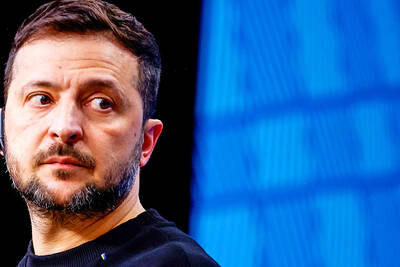Jewish leaders in Ukraine and Russia on Thursday condemned the mayor of a Ukrainian city who called a presidential hopeful “an impudent little Jew,” and Russia’s chief rabbi said he would travel there in a show of support for the local Jewish community.
The incident was a worrying sign of persistent anti-Semitism in a country that lost hundreds of thousands of Jews in the Holocaust, but also evidence of a heated presidential election campaign in a politically chaotic country and Ukraine’s tense relations with neighboring Russia.
Prosecutors have charged Serhiy Ratushnyak, the mayor of the western city of Uzhhorod, with hooliganism, abuse of office and xenophobia, said Viktoriya Popovych, a spokeswoman for the regional prosecutor’s office.
The investigation was opened after Ratushnyak assailed former parliament speaker Arseniy Yatsenyuk and attacked one of his campaign workers last month.
Popovych would not provide further details.
Yatsenyuk accuses Ratushnyak of attacking and injuring a young woman, who campaigned for him in Uzhhorod on Aug. 6. The mayor threw himself at the woman, grabbed her by the throat and threw her to the ground, causing bruises and a concussion, Yatsenyuk’s office said.
Later, Ratushnyak called Yatsenyuk “an impudent little Jew” and said the politician was confusing the January presidential vote in Ukraine with small town elections in Israel, Yatsenyuk said.
Yatsenyuk has been vague about his heritage, saying both of his parents are Ukrainian.
Ratushnyak denied he attacked the campaign activist, calling the incident a “myth.” He did, however, confirm his remarks regarding Yatsenyuk but said he believed they were not offensive.
“Is everybody obliged to love Jews and Israel? If I don’t like Jews and Israel, does that make me an anti-Semite?” he said in a telephone interview.
Ratushnyak said that Yatsenyuk has no business running for president of Ukraine.
“Do you think a Ukrainian would go there [Israel] ... set up tents there and run for president, and do you think he would not be called an impudent Ukrainian?” the mayor said.
“So they are allowed to do everything and I — on my own land — am being told which word to use and which word not to use. This is what Zionism is,” he said.
Jewish leaders said anti-Semitism should have no place in Ukraine, which lost some 1.4 million of its 2.4 million Jews during the Holocaust, many of them in western Ukraine, and which strives to integrate with the EU.
Russia’s chief rabbi, Berel Lazar, said he would visit Uzhhorod near the Hungarian border on Monday to support the local Jewish community.
Ukraine’s chief rabbi, Yakov Blaikh, also condemned Ratushnyak’s actions.
“There is no place for him in modern day Ukraine,” Blaikh said. “He is missing the point of multinational Ukraine.”

BLOODSHED: North Koreans take extreme measures to avoid being taken prisoner and sometimes execute their own forces, Ukrainian President Volodymyr Zelenskiy said Ukrainian President Volodymyr Zelenskiy on Saturday said that Russian and North Korean forces sustained heavy losses in fighting in Russia’s southern Kursk region. Ukrainian and Western assessments say that about 11,000 North Korean troops are deployed in the Kursk region, where Ukrainian forces occupy swathes of territory after staging a mass cross-border incursion in August last year. In his nightly video address, Zelenskiy quoted a report from Ukrainian Commander-in-Chief Oleksandr Syrskyi as saying that the battles had taken place near the village of Makhnovka, not far from the Ukrainian border. “In battles yesterday and today near just one village, Makhnovka,

Russia and Ukraine have exchanged prisoners of war in the latest such swap that saw the release of hundreds of captives and was brokered with the help of the United Arab Emirates (UAE), officials said on Monday. Ukrainian President Volodymyr Zelenskiy said that 189 Ukrainian prisoners, including military personnel, border guards and national guards — along with two civilians — were freed. He thanked the UAE for helping negotiate the exchange. The Russian Ministry of Defense said that 150 Russian troops were freed from captivity as part of the exchange in which each side released 150 people. The reason for the discrepancy in numbers

The foreign ministers of Germany, France and Poland on Tuesday expressed concern about “the political crisis” in Georgia, two days after Mikheil Kavelashvili was formally inaugurated as president of the South Caucasus nation, cementing the ruling party’s grip in what the opposition calls a blow to the country’s EU aspirations and a victory for former imperial ruler Russia. “We strongly condemn last week’s violence against peaceful protesters, media and opposition leaders, and recall Georgian authorities’ responsibility to respect human rights and protect fundamental freedoms, including the freedom to assembly and media freedom,” the three ministers wrote in a joint statement. In reaction

BARRIER BLAME: An aviation expert questioned the location of a solid wall past the end of the runway, saying that it was ‘very bad luck for this particular airplane’ A team of US investigators, including representatives from Boeing, on Tuesday examined the site of a plane crash that killed 179 people in South Korea, while authorities were conducting safety inspections on all Boeing 737-800 aircraft operated by the country’s airlines. All but two of the 181 people aboard the Boeing 737-800 operated by South Korean budget airline Jeju Air died in Sunday’s crash. Video showed the aircraft, without its landing gear deployed, crash-landed on its belly and overshoot a runaway at Muan International Airport before it slammed into a barrier and burst into flames. The plane was seen having engine trouble.